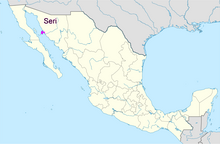Seri language
| Seri | |
|---|---|
| Cmiique Iitom | |
| Pronunciation | [kw̃ĩkˈiːtom] |
| Region | Sonora, Mexico |
| Ethnicity | Seri |
|
Native speakers
|
720 (2006) to 760 (2010 census) |
|
(possibly Hokan)
|
|
| Language codes | |
| ISO 639-3 | |
| Glottolog | seri1257 |
 |
|
Seri (Seri: cmiique iitom) is an indigenous language spoken by between 716 and 900Seri people in Punta Chueca and El Desemboque, two villages on the coast of Sonora, Mexico. The language is generally considered an isolate, however, there have been attempts to include it in the theoretical Hokan language family. There is no concrete evidence for connections to other languages at this time.
Seri has been concretely recorded by Westerners as early as 1692 but the population has remained fairly isolated. Extensive work on Seri began in 1951 by Edward and Mary Beck Moser with the Summer Institute of Linguistics. Their daughter was raised in the Seri community and later married Stephen Marlett; they have both continued work within the Seri language and community.
The language is viable within its community and is used freely in daily life. Exceptions include primary and secondary school, some parts of local church services, and communications with Spanish speakers outside of the Seri community. Most members of the community, including youth, are fluent in their language. However, the population of speakers is small and cultural knowledge is dwindling as the traditional hunter-gatherer lifestyle becomes increasingly obsolete. For these reasons, Seri is listed as a vulnerable language by UNESCO.
The term Serian family may be used to refer to a language family with Seri as its only living member; related languages have disappeared in the last couple of centuries. Attempts have been made to link it to the Yuman family, to the now-extinct Salinan language of California, and to the much larger hypothetical Hokan family. These hypotheses came out of a period when attempts were being made to group all of the languages of the Americas into families. In the case of Seri, however, very little evidence has ever been produced. Until such evidence is presented and evaluated, the language is most appropriately considered an isolate.
The name Seri is an exonym for this people that has been used since the first contacts with the Spaniards (sometimes written differently, as ceres). Gilg reported in 1692 that it was a Spanish name, but surely, it was the name used by another group of the area to refer to the Seris. Nevertheless, modern claims that it is a Yaqui term that means something like "people of the sand" or an Opata term that means "people who run fast". They are lacking in factual basis; no evidence has been presented for the former and no credible evidence has been presented for the latter.
...
Wikipedia
